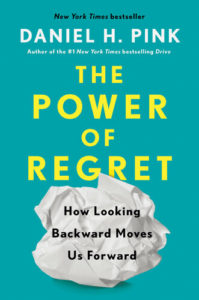
GUEST BLOG POST:
Earlier this year, I read the book Drive, by Daniel Pink. It’s an easy-to-read business book full of forward-looking non-conventional ideas on managing, motivating, and compensating people, among other topics. I liked the book so much that I started following Pink on LinkedIn, where I learned that he had published a new book titled The Power of Regret.
The Power of Regret draws on research in psychology and economics, among other subjects, to challenge assumptions about emotions and behavior. According to Pink, living a life without regret is nonsense, even dangerous. He asserts that regrets are a fundamental part of our existence, and by considering them, we can make smarter decisions going forward. Sounds exciting, right?
 After reading the book, I started to consider my own regrets as an internal auditor and what we might be able to learn about the regrets of other internal auditors that could help us improve in our profession.
After reading the book, I started to consider my own regrets as an internal auditor and what we might be able to learn about the regrets of other internal auditors that could help us improve in our profession.
To that end, I conducted a survey across multiple social media platforms asking what was the most significant regret current and former internal auditors had during their tenure in the profession. I received a total of 40 responses. Before we get to the results, it is important to note a couple of essential elements from the book:
Regrets are universal and can be divided into four main categories:
- Foundation: Regret for not being conscientious and fulfilling your duties.
- Boldness: The regret for not taking action in specific circumstances. According to Pink’s survey, people are twice as likely to regret something they didn’t do than something they did do.
- Connection: The regret for unrealized relationships.
- Moral: The regret for acting unethically and not doing the right thing.
There are generally two narratives we tell ourselves throughout life that shape who we are:
- Contamination narratives: When things go from good to bad.
- Redemption narratives: When things go from bad to good.
The trick is using regrets to create our own redemption story!
Without further ado, here are the main regrets from your fellow former and current internal auditors:
Connection (40 percent): By far the most common form of regret internal auditors relayed in the survey is the failure to connect with someone in some way, particularly audit clients, well summarized by one respondent: “The biggest regret was in not seeking enough connection, collaboration, and interaction with the auditees and mainly working from my internal audit bubble.”
As internal auditors, how often do we “solve” several company problems in our internal discussions, only to find out that it is not as easy as it looks when we truly put ourselves in someone else’s shoes? And most importantly, we fail to build lasting relationships by either being too abrasive in our approach or by not actively seeking out internal networking opportunities.
As another respondent entrusted, “[the biggest regret was not] building trust and developing better relationships with business partners.”
Boldness (35 percent): A close second, boldness was also a big regret internal auditors shared as part of the survey. The results in this category were varied, ranging from regrets about not getting into the profession sooner, not leaving the profession soon enough, wondering where one might be if the career was not dedicated to internal audit, not aggressively pursuing other opportunities, including opportunities at different organizations, and not trying to move up the ranks faster.
Additionally, three respondents touched on a topic that I believe many others will relate to, politics. As summarized by one of the responses: “[The biggest regret was in allowing] people to play power politics to divert the attention from the problem, findings and [accepting] it to avoid backlash.” How many times have we compromised in our audit plans or reports to please certain auditees so that we don’t “rock the boat?” Granted, what we report can impact people’s careers, as I’ve seen vice presidents, directors, and managers lose their jobs due to findings in a report or subsequent investigations related to findings in a report. However, as long as what we report is true and accurate, we shouldn’t worry, right? Maybe. More on this in the Morals section below.
Foundation (25 percent): The foundation regret was a bit tougher to define, but in this category are included regrets such as not obtaining the Certified Internal Auditor (CIA) certification or other professional designation early on, which was surprisingly explicitly called out by three respondents. Another common regret in this area was not working enough with data analytic tools.
Two respondents listed an item that I believe many others will relate to: not being strategic or thoughtful about the learning opportunities pursued. Does the following sound familiar: You are close to your continuing professional education (CPE) reporting period, and you start scrambling for useless credits. You endure endless webinars that we don’t pay attention to, just clicking on the occasional “I’m present” button so that we can get that CPE certificate? Why do we do that to ourselves? Let’s stop thinking about learning as a fixed, structured, and rigid process and start thinking about it as an exciting and fun process, where we don’t necessarily have an expectation other than our own desire to know more about the topic.
Moral (0 percent): Not surprisingly, there were no moral regret responses. According to Pink’s survey, this category typically represents the lowest percentage of responses; however, moral regrets hurt the most and last the longest. The closest response I received to this category was the following, and it ties back to the boldness section above:
“The biggest regret was in not censuring my work when a senior executive told me to or ‘bad things would happen’ and then getting fired for it. Subsequently spending money on lawyers, but then not being able to carry through as the organization outspent me with their consultants and lawyers to protect the senior executive. F- that, I don’t regret anything. My integrity is intact, though my bank account is depleted.”
Talk about boldness. Would you be that bold?
What was your biggest regret in your career? Think hard about that question, and once you have the answer start writing your redemption story. You may even be bold enough to share it with us in the comment section below.
Even if you don’t, it’s worth spending some time reflecting on our biggest regrets, professional and personal, and thinking about what we could do better or differently going forward. Done right, it may even help us avoid some of those regrets in the future. ![]()
Jon Taber, CPA, CIA, CFE, CFF, is an Internal Audit Manager at Casey’s, based in Ankeny, Iowa. He is also the host of the AUDIT 15 FUN podcast.


Excellent piece! Scratching for CPEs , very true. It is not easy to stand our ground in a difficult situation, so kudos to the survey respondent. Thanks for recommending the book, I will read it.
Very good! Gonna share it with my fellows.
I was both an Internal Auditor and auditee or audit client. This article brings out regrets of the internal auditor that make a lot of sense.. But how about regrets of the audit client? I would assume that their biggest regret, I known it was mine, was not being audit audit ready and fearing the auditors when they arrived. My regret was executives did not see the need to have the company provide adequate education to audit clients before audits were conducted. A lot more could be accomplished for the good of the company if they were.